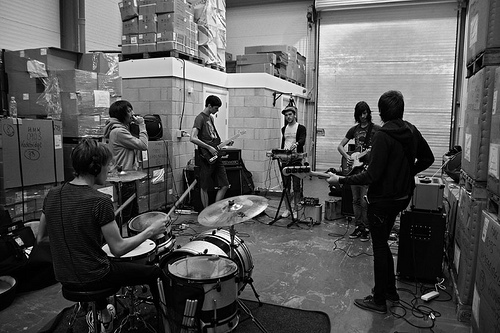What does your band do: practice or rehearse? Good bands do both.
Practice
Practicing is something you usually do by yourself. Learning your part in a song, improving your skills, working on new techniques and exploring new styles in your own playing. It’s also known as ‘woodshedding’.
When you practice, it’s all about you. You don’t have to worry about anyone else’s part in the song, or making mistakes, or even stopping in the middle of a riff because you forgot how it goes. That’s the great thing about practice–nobody knows about it but you. There’s a lot of freedom and endless room to explore. If you want to spend 45 minutes on the intro to a song, you can do that without bothering anybody.
Rehearsal
When your band rehearses, things are different. Now whatever time someone takes up with something is band time. Those 45 minutes you spent on that song intro by yourself? If you’re in a 5-piece band, that same amount of time would cost the band an additional 3 hours because 4 people have nothing to do for those 45 minutes. If you’ve ever tried to schedule rehearsal time, you know how precious it is and how important it is not to waste any of it.
What Bands Practice
Bands work on new skills together, too. Sometimes your band might work on an idea like improving your on-stage communication or cueing. Or maybe you’re working on a technique for ending songs that you all really like and will use a bunch of times (although not on every song, but that’s a different article).
But for the most part, when your band gets together, they’re going to rehearse. Rehearsal is playing your songs and your show over and over again so that you polish all the parts. You’re not learning how to play better, you’re learning how to play that show better. While those things go together, they are not the same. In practice, you might explore new ways to do a thing as you figure it out. In rehearsal, you generally play things the same way every time. This allows everyone to memorize all the parts of the song so that they can play it without having to think about it, which frees up brain cycles to do all the other things that go with playing live–audience interaction, band interaction, dealing with random things, covering mistakes, and so on. The more you know your material, the easier it is to play, and the more fun you can have playing it.
Assume The Position
Usually when bands practice, they face one another in a circle. This makes it easier for people to communicate and lends a sense of unity. But when you rehearse, you should stand just like you do on stage so that you ‘play as you train’. Otherwise you risk developing bad habits like ignoring the audience, which is the easiest way there is to have them not like you.
 |
 |
Rehearsal: Play each song until you never want to play it again, then play it a million more times.
Have A Cunning Plan
Plan out what you’re going to work on in rehearsal, and stick to that plan as much as possible. Deciding in the middle of a session takes time, and everyone may not agree right away on what to do. Remember also that this is about rehearsing your show, so unless you have specifically planned time for soul-searching and sharing your life stories with each other, keep rehearsals about the music and your act. Other things can be scheduled at other times.
A Thin Line Between Love & Hate
It’s interesting what happens when bands work on new songs. In a surprising number of cases, the person who brought a particular song to the band because they absolutely love it is the first one who ends up hating it after the band plays it hundreds of times. And even more strangely, sometimes the person who hates a new song will end up finding something in it that they really like, and want to play it all the time. This kind of role reversal is what keeps things interesting.
Whether you love or hate a given song, you must make your peace with it if the band as a whole wants to play it. Or even if the whole band doesn’t like it but your audience demands it. “Give ’em what they want” is the second rule in show biz, right after “the show must go on.”
When we wrote ‘The Power of Love’, we had no idea that we’d be playing it every damn night for the next 30 years.” — Huey Lewis
Rehearse Everything
When you go into rehearsal, that’s not just the music you’re going to play. Rehearse the song’s intro patter, any stage business or choreography, switching instruments, the outtro…all of it. There is a risk in over-rehearsing patter so that it becomes flat, see this article for more on that idea. Spontaneity is hard because you have to practice it and then it’s not really all that spontaneous.
Start In The Middle
Rehearsing parts of songs can be very useful. If everything is working except the bridge, then work the bridge until it’s right and then go back and try the whole song again. Get used to starting in random spots–this saves a LOT of band time. The more familiar you make yourself with the music, the easier this will be. It also gets better with practice, both with the band and by yourself.
It’s All About Us
Rehearsal time is band time. If you need to talk over something with one person, do it on a break or at another time unless it’s a very short conversation (like under 2 minutes). If a section of the band needs to go over something, the same rule applies. if it’s really short, go ahead and do it. If not, do it on a break. Whatever you can to make the best use of everyone’s time will be appreciated by everyone.
That said, don’t be afraid to take breaks and even wander off into random discussions from time to time. We all need mental rest, just be careful that these breaks don’t become too long or happen too often. This is work time, so treat it as such.
Sectionals
If your band can’t all be together, that’s OK. You can still use the time to good advantage. Work on things where you don’t need everybody. If you think about your songbook a little, you’ll find all kinds of places where part of the band can improve a song and then bring the missing people up to speed later. Don’t waste precious time by giving up on an idea if someone’s not there.
Enough Is Enough
Marathon rehearsals may sound like a good idea, but they aren’t. After a while, everyone gets so tired that you end up going backwards. If your band likes long rehearsals, then schedule a big break of at least an hour where folks can relax, maybe eat something, or otherwise not think about music for a bit. After you come back from that break, try to keep your second session a little shorter than the first so that people don’t feel burned out. If everyone is tired and things just aren’t working, then stop and come at it fresh next time.
A Note About Chemicals & Liquids
Break time should not be a time to get drunk, high, or otherwise altered, unless your band rehearses in that state (also another article). Having a beer or two is fine, but remember you are still at work. If everyone in the band is not able to do their jobs effectively, that’s also a waste of band time.
The Show Shows
In Bandmakers, it’s amazing how just one extra rehearsal a week will help a band improve over the short span of the class. The improvement is not just in the music, but in the way the band members interact. Rehearsals are a time to build friendships, trust, and understanding about what each member of a band can bring to the project. The more time your band puts into rehearsal, the better the show will be. It’s that simple.
